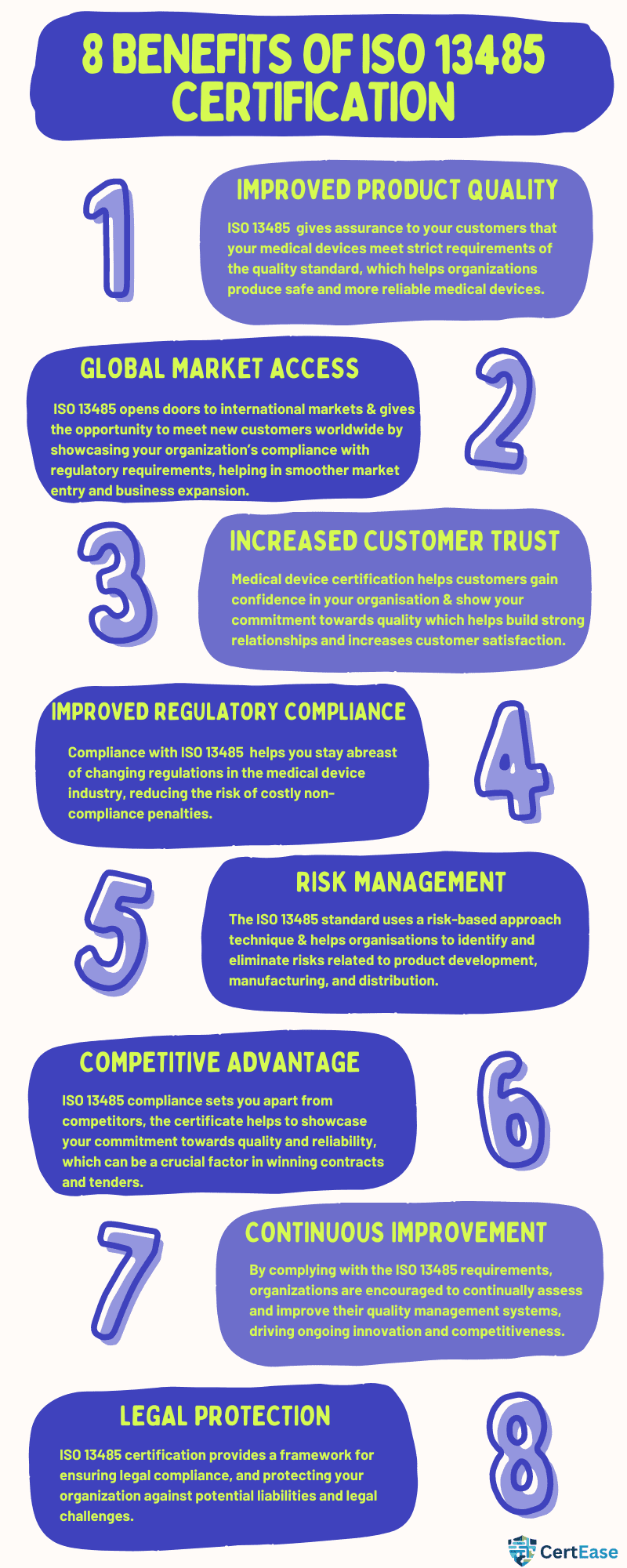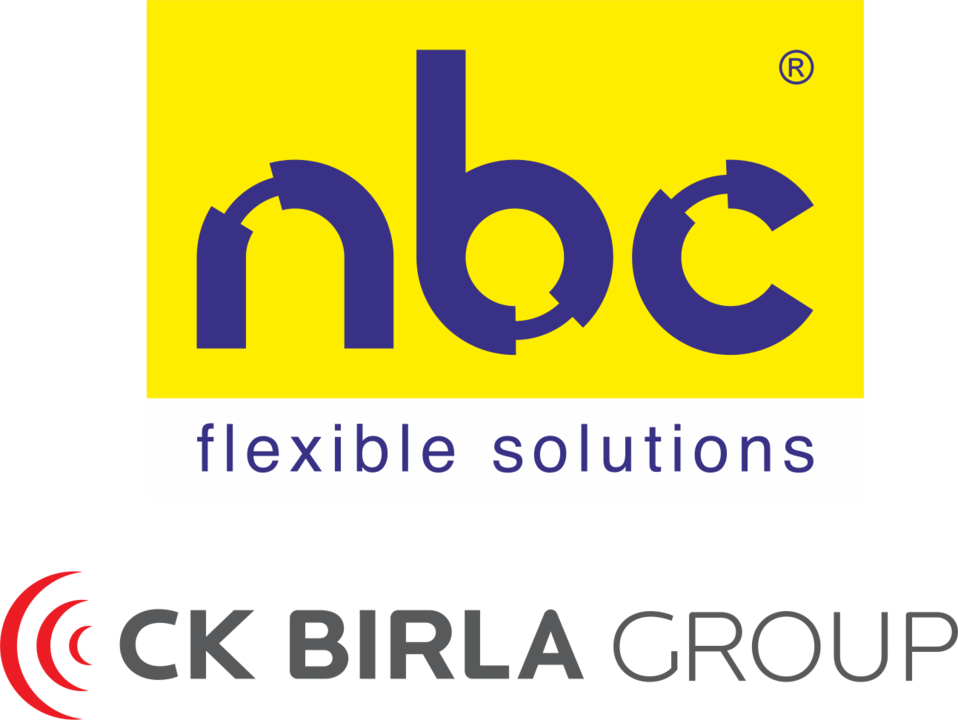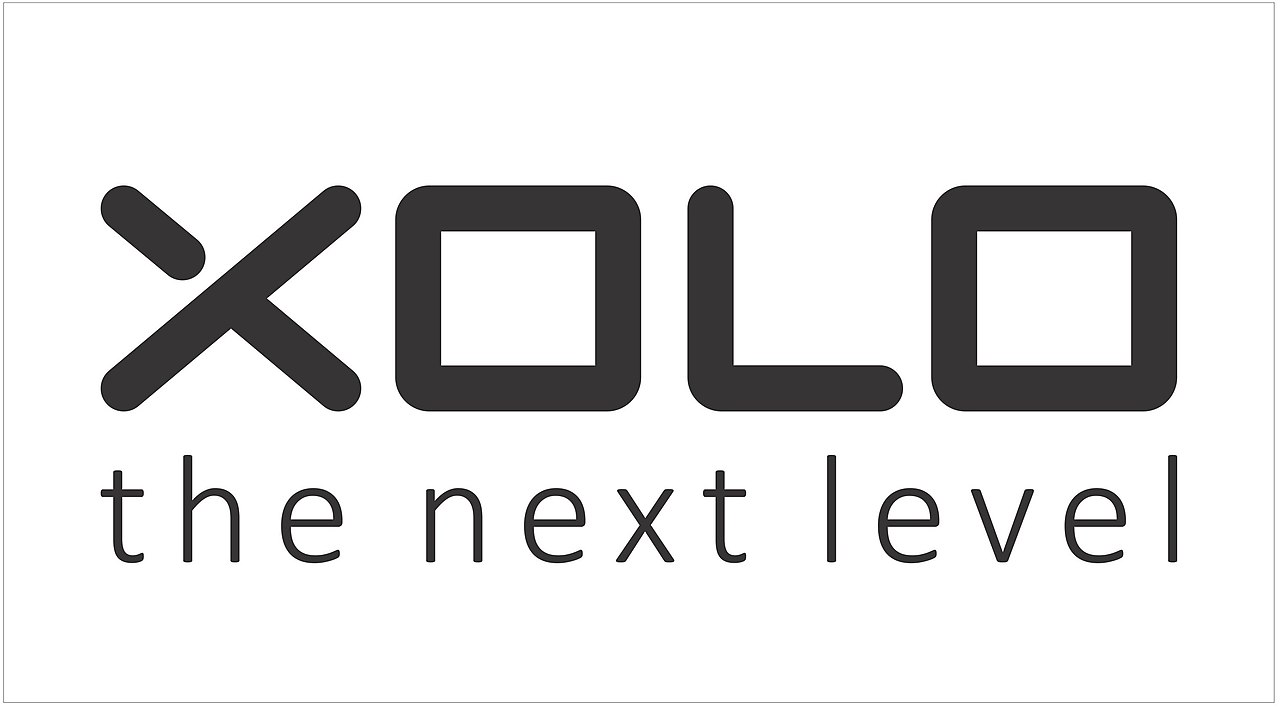Please fill out the details below, and one of our executives will be in touch with you shortly!
CertEase is a top provider of ISO 13485 certification services in Australia. We provide ISO 13485 consulting services in Australia and across major cities which include Sydney, Melbourne, Brisbane, Perth, Adelaide, Gold Coast, and Canberra.
Our aim is to make ISO 13485 certification in Australia accessible and affordable for all organizations that are looking to get MDQMS compliant, regardless of their size or organization, Our services cover everything needed for ISO 13485 certification which includes services such as gap assessment, training, documentation, internal audit, registration, third-party audit & assistance in getting the certification.
We provide customized ISO 13485 consultation services tailored to meet your specific Medical Devices Quality Management Systems certification needs in Australia. ISO 13485 is not just about meeting standards; it’s about ensuring the quality and safety of medical devices. By implementing the ISO 13485 standard, you can establish a strong quality management system within your organization which will help reduce risks and streamline the manufacturing process & the effectiveness of your medical devices.
With ISO 13485 Certification in Australia, you not only meet regulatory requirements but also improve the credibility and reliability of your medical devices. Contact CertEase to guide you through the ISO 13485 certification process and improve the quality and safety of your medical devices & provide quality services to your customers and patients.

ISO 13485:2016 certification in Australia is a globally recognized standard that sets out the requirements for a quality management system for medical devices. It sets out requirements for organizations that are involved in the design, development, production, storage, distribution & installation of medical devices. The main aim of the ISO 13485:2016 standard is to ensure that medical devices are safe and effective for their intended use.
It helps reduce the risk & improve the overall quality of the processes and safety of the medical devices, which will help improve customer confidence and extend market access. The ISO 13485:2016 standard was first published in the year 2003 & the current version of the standard is ISO 13485:2016. This is an internationally agreed & accepted quality management system standard that sets out the requirements specific to the medical devices industry.
ISO 13485 meaning: MDQMS in Australia stands for Medical Devices Quality Management System. It is a quality standard for medical devices that provides a framework & structure for organizations which is established by ISO 13485:2016 standard, This standard outlines requirements for organizations that are involved in the design, production, installation, and servicing of medical devices.
MDQMS ensures that medical devices meet regulatory requirements and are safe and effective for use. The standard includes processes and procedures for quality management, risk management, regulatory compliance, and continual improvement, by implementing MDQMS organizations can improve the overall quality and safety of medical devices.
ISO 13485 standard consists of 8 clauses that provides guidelines for the requirements of the Medical Devices Quality Management System (MDQMS) in Australia. These 8 clauses cover various aspects of ISO 13485 certification requirements in Australia within organizations which cover the design, production, installation, and servicing of medical devices. Below is the list of clauses:
· Scope
· Normative references
· Terms and definitions
· General requirements – Quality management system
· Management responsibility
· Resource management
· Product realization
· Measurement, analysis, and improvement
These clauses provide a detailed framework for developing and maintaining an effective MDQMS.
The ISO 13485 certification fees in Australia depend on various factors such as the number and type of medical devices that are being manufactured, the scope and size of the business, the number of employees & departments operating within the organization, the certification body & the accreditation that is chosen, and also the complexity of the organization and its product are the other factors that may influence the cost of MDQMS implementation in Australia and it also important to consider the number of locations the organization has and its current quality management system in relation to ISO 13485 requirements.
It’s important to select an ISO 13485 certification body in Australia that offers a fixed total fee at the beginning of the process to budget the ISO 13485 certification journey without the surprise of any additional expense later.
Our range of ISO 13485 implementation services includes everything from scratch starting from gap assessment to assistance in the preparation of documentation which includes the MDQMS Manual, Procedures, templates, policies & implementing the MDQMS into your system, We also provide ISO 13485 Awareness Training & perform ISO 13485 Internal Audits, offer support in certification body audit, and assistance in obtaining the ISO 13485 Certification.
To know the approximate cost of ISO 13485 implantation in Australia you can drop an inquiry on our official website you will receive a detailed proposal with the timeline, deliverables & the cost for the service.
MDQMS certification in Australia is specifically important for companies that are into manufacturing of items such as medical equipment, surgical instruments, diagnostic devices, and other medical device-related supplies. ISO 13485 registrations in Australia are important for companies to ensure they meet strict requirements of the quality management standards in the manufacturing & development of medical equipment.
From small-scale medical instrument manufacturers to large-scale medical device companies, Medical device ISO certification in Australia is essential. It’s not just limited to the companies making the devices; suppliers, distributors, and even those involved in sterilization and packaging need this certification to maintain high-quality standards and regulatory compliance.
In simpler terms, if a business is in any way connected to the creation, distribution, or servicing of medical devices—whether it’s manufacturing, supplying components, or even handling packaging—it likely needs ISO 13485 certification to ensure that its products meet the necessary quality and safety standards.
Implementing ISO 13485 into your organization has numerous benefits to offer, below listed are some of the reasons why every medical device manufacturing organization in Australia should consider complying with the ISO 13485 quality management system in Australia
Improved Product Quality: ISO 13485 in Australia gives assurance to your customers that your medical devices meet strict requirements of the quality standard, which helps organizations produce safe and more reliable medical devices.
Global Market Access & Get New Customers: ISO 13485 accredited in Australia opens doors to international markets & gives the opportunity to meet new customers worldwide by showcasing your organization’s compliance with regulatory requirements, helping in smoother market entry and business expansion.
Increased Customer Trust & Confidence: Medical device certification in Australia, helps customers gain confidence in your organization & show your commitment towards quality which helps build strong relationships and increases customer satisfaction.
Improved Regulatory Compliance: Compliance with ISO 13485 in Australia helps you stay abreast of changing regulations in the medical device industry, reducing the risk of costly non-compliance penalties.
Streamlined Processes: Implementing ISO 13485 fosters efficient and consistent processes throughout your organization, leading to reduced errors, and waste, and improved overall operational efficiency.
Risk Management: The ISO 13485 standard uses a risk-based approach technique & helps organizations to identify and eliminate risks related to product development, manufacturing, and distribution.
Competitive Advantage: ISO 13485 compliance in Australia sets you apart from competitors, the certificate helps to showcase your commitment towards quality and reliability, which can be a crucial factor in winning contracts and tenders.
Continuous Improvement: By complying with the ISO 13485 requirements, organizations are encouraged to continually assess and improve their quality management systems, driving ongoing innovation and competitiveness.
Supplier Relationships: ISO 13485:201 Certification encourages suppliers to meet the same quality standards, helping build strong reliable supply chains, which is very important in the medical device industry.
Legal Protection: ISO 13485 certification provides a framework for ensuring legal compliance, and protecting your organization against potential liabilities and legal challenges.
ISO 13485 attestation in Australia is not just about meeting regulatory requirements it is also about maintaining the quality & safety of the medical devices and developing continuous improvement within the organization.
ISO 13485 certification is issued by the certification bodies accredited by national accreditation bodies which are affiliated with ISO’s International Accreditation Forum (IAF). These ISO 13485 certification bodies in Australia assess whether a company’s quality management system meets the requirements set by the ISO 13485 standard, which is specifically related to medical devices.
The ISO 13485 certification process in Australia involves thorough audits and evaluations of documentation & your facility to check compliance with quality standards, risk management, and regulatory requirements set by the MDQMS standard. Once the company is able to successfully clear the audit & showcase compliance with the ISO 13485 standards, the certification body issues the certificate with the external audit report.
This certification states to customers, regulatory authorities & interested parties that the company consistently produces safe and effective medical devices that are of good quality by maintaining quality management practices.
The validity of an ISO 13485 certificate usually lasts for three years. During this period of 3 years of span, the ISO 13485-certified organization in Australia must undergo regular surveillance audits to maintain compliance with the MDQMS requirements.
These surveillance audits happen once a year & they serve as checkpoints to verify & confirm that the organization maintains its quality management system and continues to meet the necessary standards for producing medical devices. After the completion of the three-year validity period, the organization must undergo a recertification audit to renew the ISO 13485 certification in Australia, showcasing the company’s commitment to quality and continual improvement in the medical device industry.
ISO 13485 consultation process in Australia involves several steps, Below is the overview of the steps involved in the process.
1. Understanding Requirements: Firstly understand the ISO 13485 standard and its requirements for quality management systems in the medical device industry and what are the resources and facilities required for the smooth implementation process. Appoint a Management representative to oversee the entire process.
2. Assessment: Evaluate your current quality management system to identify gaps by conducting an ISO 13485 gap assessment in Australia and identify areas that need improvement to meet the ISO 13485 quality system in Australia.
3. Planning: Develop a detailed plan that outlines how you will address the identified gaps and implement changes to meet ISO 13485 requirements in Australia.
4. Training: Provide ISO 13485 2016 training to all the employees & the process heads on ISO 13485 standards, quality management principles, and their roles & responsibilities in maintaining compliance.
5. Documentation: Create and maintain ISO 13485 documentation in Australia such as quality manuals, procedures, policies, work instructions, and forms & records required by the ISO 13485 standard.
6. Implementation: Put your plan into action by implementing the necessary changes and improvements to your existing system & get it aligned with the requirements of MDQMS.
7. Internal Audits: Conduct regular ISO 13485 internal audits at least once a year to check the effectiveness & performance of your Medical device quality management system and identify areas for improvement and make necessary changes.
8. Management Review: Hold management reviews to evaluate the performance of your MDQMS and make decisions & necessary changes to maintain suitability, adequacy, and effectiveness.
9. Corrective Actions: Take corrective actions to address any non-conformities or deficiencies that are identified during internal audits or management reviews.
10. External Certification Audit: Connect an ISO 13485 accredited certification body in Australia to conduct an external certification audit to check your organization’s compliance with ISO 13485 standards.
11. Final Certification: Upon successful completion & clearance of the external certification audit from the CB, the organization will receive ISO 13485 certification, showcasing the organization’s commitment to quality management in the medical device industry.
12. Continual Improvement: Continuously monitor and improve your MDQMS by conducting regular internal audits to improve efficiency, effectiveness, and customer satisfaction.
Hiring an ISO 13485 consulting agency in Australia is important because they can expedite the implementation process & help the organizations in all the activities provide expert guidance where it is necessary & increase the likelihood of successful certification, and help streamline your process & improve your organization’s MDQMS practices in the medical device industry. Below listed are some of the roles & responsibilities of ISO 13485 consultancy in Australia.
ISO 13485 quality assurance in Australia is built on many key principles that are required for effective quality management in the medical device industry:
1. Customer Focus: understanding the requirements and expectations of the customer and meeting their requirements is important. This principle focuses on delivering products and services that satisfy customer needs & expectations.
2. Leadership: Strong leadership and commitment from top management is important for developing and maintaining a Medical device quality management system. it is important for the leadership team to set the vision, goals, and direction for the organization’s quality practices.
3. Involvement of Staff: The main focus of this principle is to Recognize the importance of people at all levels of the organization & provide them with the necessary resources & support to contribute to developing a culture of quality and continuous improvement effectively within the organization
4. Process Approach: This principle involves understanding, managing, and improving processes to improve the overall performance of the organization. Viewing activities as interconnected processes will help achieve objectives effectively & efficiently
5. Systematically Planned Approach to Management: This principle involves developing clear processes, procedures, and controls to manage activities and resources effectively & efficiently. Adopting a systematic approach will help achieve quality objectives consistently
6. Continual Improvement: The main focus of this principle is ongoing monitoring, evaluation, and improvement of the organization’s processes and its system. continual improvement is very important for any organization that wants to improve its performance and meet customer needs
7. Evidence-based Decision Making: Making decisions based on data that is reliable and with the available evidence helps effectively in solving problems and management of risk.
8. Relationship Management: This principle focuses on collaboration, communication, and cooperation to achieve objectives. Building and maintaining strong relationships with suppliers, partners, and other stakeholders will help mutually & towards the organization’s success.
Complying with these principles helps organizations develop a strong quality management system that helps in product safety, and regulatory compliance, and improves customer satisfaction in the medical device industry.
To apply for ISO 13485 for medical devices in Australia, the organization will need to provide several documents related to MDQMS & its processes. To meet the requirements of ISO 13485 standard for medical devices in Australia the organization must Create these documents. Here are some of the key documents which are usually required:
These are just some examples of the documents that are required to apply for ISO 13485 certification in Australia.
The requirements of each document may change from one organization to another based on the certification body, the size of the organization and departments operating, and the complexity of the organization. It’s important to connect with a certification body or an ISO 13485 consulting firm in Australia to understand & provide all necessary documentation to meet the requirements and obtain the certification.
ISO 13485 is an internationally recognized medical term ISO standard in Australia that specifies requirements for a quality management system (QMS) in the medical device industry. Here are some key requirements of ISO 13485:
The main aim of the ISO 13485 requirements is to make sure that products are produced consistently & meet regulatory and customer needs.
ISO 13485 certification audit services in Australia are provided by certification bodies accredited by national accreditation bodies which are affiliated with the International Accreditation Form (IAF). These certification bodies are specialized in conducting audits & checking the organization’s compliance with ISO 13485 standards for quality management systems in the medical device industry.
They employ trained IS0 13485 auditors to conduct thorough evaluations of companies’ quality management systems to check compliance with ISO 13485 requirements.
These audits are important for organizations that are looking to get certification ISO 13485 in Australia Because only after clearing the audit does the organization receive the certification. ISO 13485 auditing bodies in Australia play a very important role in helping companies showcase their commitment to producing safe and effective medical devices while maintaining high-quality standards.
The ISO 13485 audit process typically involves several key steps. First, the organization looking to get the certification should select an ISO 13485-accredited certification body to conduct the audit. Next, the auditor is appointed by the certification body & audit is the date scheduled, and the auditor will review all the organization’s quality management system documentation & look out for evidence to ensure compliance with ISO 13485 standards.
During the on-site audit, the auditor will inspect the organization’s processes, procedures, and records to verify the effectiveness of the ISO 13485 implementation. The auditor will conduct interviews with the staff and collect further evidence regarding the process. After the audit, the certification body checks for findings that are found during the audit and decides whether the organization meets ISO 13485 requirements. If the audit is cleared successfully, the organization receives ISO 13485 certification.
When it comes to ISO 13485 consulting services in Australia, CertEase stands out as a top choice. With their extensive experience in the industry over 15 years and dedication to quality, CertEase offers tailored solutions to make sure your medical device manufacturing processes meet the highest level of quality standards. Their team of experienced professionals provides expert guidance & assistance throughout the process, from initial project planning till you receive the final certification, ensuring smooth compliance with ISO 13485 requirements.
Collaborating with CertEase it is assured that your company will receive personalized attention and support every step of the ISO 13485 implementation, which leads to enhanced efficiency, reliability, and compliance in your operations. Choose CertEase for exceptional ISO 13485 consulting services that help your success and satisfaction.
To find a reliable ISO 13485 consultant in Australia, start by researching online or through industry connections or by checking with ISO 13485-certified companies in Australia. If possible look out for recommendations from companies in the medical device industry.
Make necessary checks about the consultant’s experience and qualifications in ISO 13485 consulting in Australia. Check for their experience & their previous projects, which should include case studies and client testimonials.
Schedule a meeting with the consultant to discuss your needs and check for compatibility with the consultant. Discuss the project scope, timeline, and deliverables before finalizing the contract & monitor regularly the progress, and provide feedback so that the project stays on track.
Following these steps will help you hire a qualified ISO 13485 certification agency in Australia to support your organization in achieving certification or building a strong quality management system.
To obtain ISO 13485 certification for medical devices in Australia, reach out to CertEase, your trusted partner in quality management in Australia. Begin by contacting us at +91 8951732524 or via email at contact@certease.com. Our experienced team will guide you through the entire process of ISO 13485 step by step.
The first step of the process is to conduct a gap assessment of your current quality management system to identify areas for improvement next we will work closely with your team to develop documentation & implement tailored strategies to meet ISO 13485 standards. This includes activities such as documentation review, training, process optimization, Internal audit & more
Once your quality management system aligns with the requirements for ISO 13485 standard, Our consultants will assist the organization in scheduling an audit with an ISO 13485 accreditation body in Australia. During the external audit, our experts will support you and make sure all necessary documentation and processes are in place to clear the audit.
After successful completion of the external audit from the certification body, the organization will receive ISO 13485 certification, which helps to showcase to your customers & interested parties your commitment towards quality and compliance in medical device manufacturing. Contact CertEase to get the certification process streamlined and Improve the quality of your operations.

Directly or indirectly improving the organization’s profits in the short/long term in a sustainable manner
Our seasoned professionals bring expertise to every project, ensuring precision and success.
Our dedicated team ensures reliability and prompt solutions around the clock, Count on us for unwavering support.
Our experts bring verified proficiency to address your specific needs. Choose assurance, choose excellence.
Tailored to suit your specific business needs, our services make it effortless for you to obtain high-quality certifications.








Please complete the form below to receive a detailed Cost Estimation.
